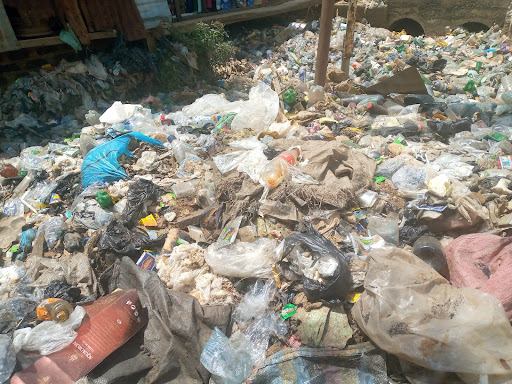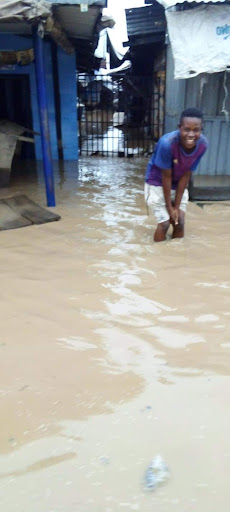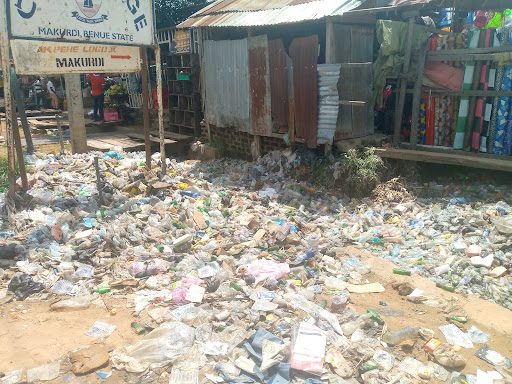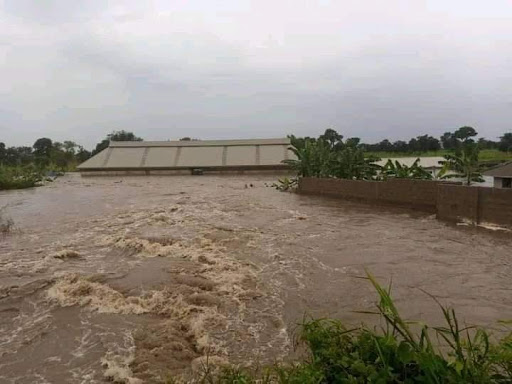Wurukum: Indiscriminate Refuse Dumping Putting North-central Nigeria Market At Flooding Risk
Traders in Wurukum market, Benue State, in North-central Nigeria have lost goods worth millions to floods. But some are yet to understand how they are contributing to the problem.

The heavy downpour between Oct. 21 and 22, 2021 in Makurdi, Benue State, North-central Nigeria, left the Wurukum market submerged. While some residents see it only as a natural disaster, some point at poor sanitation and indiscriminate refuse dumping.
Seember, 32, who sits beside the entrance of Wurukum market, peels and roasts there almost daily. Because of the overwhelming number of customers who wait to buy from her, she dumps her waste beside her, with the intention to dispose of it later.
But by the end of the day’s work, when darkness has fallen, she puts the refuse in a gutter.
“Sometimes I leave it here where I am seated. And when I come the next day, water would have carried them away,” she tells HumAngle.

“I could gather and dispose of the dirt properly but that time of the night is too far to begin to walk around looking for where to throw dirt,” she adds.
Seember is not the only guilty trader.
Madam Eunice Agber, a popular food vendor in the market, had just washed vegetables when HumAngle got to her. In the gutter before her are some of the waste products including nylon bags.
“When it rains, the water will carry them away,” she says confidently.
People like Eunice Agber do not know that littering the environment can cause floods and endanger lives.
The danger
Although the Wurukum market has a lot of water drainages, human activity leads to their blockage.
When people drop dirt indiscriminately or litter the environment, the rain washes them into gutters, thereby disrupting proper flow. It does not matter if some try to keep their environment clean, they too suffer the effect.

“I have complained countless times that dumping dirt in the gutters makes it difficult for water to pass. It blocks the linkages thereby causing floods and it also causes erosion many times,” Mr Chinedu, a businessman in the market, says.
“What I normally do is clean the gutter in my front as much as possible. It has helped me to keep a clean environment for my customers. The flood has not affected me directly because I have raised a little fence to prevent water from entering easily. However, many of the people around have lost many goods to it.”
The effect
Idris Tsafa, 47, had locked his shop one fateful day after 3 p.m. when the clouds began to gather.
“I thought I had locked the shop behind water. It rained till the next day. No one could access the market that day so I left. When I returned the next day, I noticed that my shop was flooded and I could see the water level in the wall.”
“That was how goods like my seven bags of garri and other perishable goods worth about N1.2 million got drenched,” Tsafa said.
Tsafa was a successful business owner selling foodstuffs and provisions in the Wurukum market. But not anymore. His fortune has been cut short.
Another victim, Mama Lydia, 68, has lost about N500,000 worth of goods between 2012 and 2021, due to floods. She recounted her experience as a trader when she first came to the market.

“At first my line of business was consumables and perishables like tomatoes, pepper, onions, and vegetables. I bought them in bulk and then resold them. Several times floods have carried them, other times floods restrain me from entering the market. And not selling most of these goods like tomatoes and vegetables early enough will spoil them and some lose their freshness. At that point, people will no longer want to buy them so you sell at a lesser amount, ” she says.
Others, like mama Lydia, have also changed their line of business. Many of them now prefer daily hawking of bread and other consumables to setting up shop in the market.
A typical example is Rachael Abu who makes at least N500 to N1000 a day from hawking bread and other snacks.
“I have three children, two boys and one girl. This is how we feed. I used to sell inside the market; my husband had a shop there. But it was flooded some time ago,” she tells HumAngle.
Health and safety risk
Materials dumped indiscriminately contain harmful substances like sharp objects, contaminated medical waste, asbestos, and tires. Tyres and rubber are breeding homes for mosquitoes which increases the chances of malaria.
These and other objects pose serious health and safety risks when picked by children, either for play or to put in their mouth.
Contaminated medical waste, according to Conserve Energy Future, (CEF) “spreads disease dramatically. Waste leads to harmful bacteria that grow exponentially.
“Illegal dumpsites can also block storm water drainage systems thereby turning into a breeding ground for disease and causing flooding.”
Efforts
Mr Terver Mlumun, an environmental officer with the Benue State Environmental Sanitation Agency (BENSESA) told HumAngle that several efforts are being made to quell the increasing trend, However, the efforts are not being followed with compliance.
“The problem of illegal dumpsites isn’t today just like the flood itself. We have preached, warned, even arrested and fined them. But no compliance.”
“There are designated refuse-carrier trucks in town, with different dirt tanks. Their service is to pick up trash from legal dumpsites for onward disposal.”
Support Our Journalism
There are millions of ordinary people affected by conflict in Africa whose stories are missing in the mainstream media. HumAngle is determined to tell those challenging and under-reported stories, hoping that the people impacted by these conflicts will find the safety and security they deserve.
To ensure that we continue to provide public service coverage, we have a small favour to ask you. We want you to be part of our journalistic endeavour by contributing a token to us.
Your donation will further promote a robust, free, and independent media.
Donate HereStay Closer To The Stories That Matter




